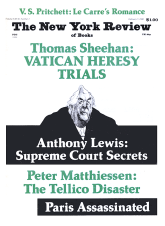In response to:
She Had It All from the October 11, 1979 issue
To the Editors:
Ms. Diane Johnson, in her comments on my book. The Double Life of George Sand, Woman and Writer (NYR, October 11), thinks it “impossible” that Darwinian notions could have been debated at Nohant as early as 1853. However, George Sand’s diary for October 24, 1853 (in the Bibliothèque Nationale) mentions an important discussion at Nohant on geology and kindred matters; and the novelist doubtless alluded to this conversation in a letter to her daughter Solange that has so far failed to come to light. For the tenor of that discussion may be further gleaned from Solange’s reply to her mother early in November: “Emile is right to claim the orang-outang as his grandfather….” As Monsieur Georges Lubin observes, the Emile in question is Emile Aucante, the novelist’s secretary. It would not be surprising if Darwinian ideas already in the air or adumbrated in the naturalist’s early work were being discussed at Nohant, where not only the everinquiring novelist herself but her son Maurice, as well as members of their circle, were passionately interested in natural history.
Renee Winegarten
Middlesex, England
Diane Johnson replies:
Ms. Winegarten’s assertion, mentioned by me among examples of her unclear writing, was that “the destructive ideas of Charles Darwin concerning spontaneous creation, the animal origins of mankind, and the survival of the fittest were already being discussed at Nohant in the autumn of 1853….” Her amplification still gives no reason, that I can see, to suppose that Sand and her circle had more than the ordinary information available to intellectuals of their day about nineteenth-century discoveries in geology by Lyell and others, and ideas of evolution which had been around since the eighteenth century at least, but which I do not believe were associated in 1853 with Darwin himself. Neither does a discussion on “geology and kindred matters” warrant such an association. Ms. Winegarten is plainly no expert in Victorian science, but since I am really not either, I would welcome clarification from someone more knowledgeable about the extent to which Darwin’s own ideas were known before their publication. It would also be interesting to know whether it was George Sand or simply Ms. Winegarten who found the new natural history “destructive,” and why.
This Issue
February 7, 1980



